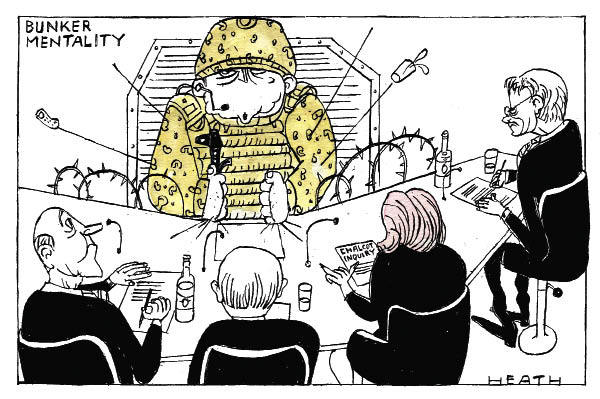Mr Gordon Brown, the Prime Minister, appeared before the Chilcot inquiry into the Iraq war and denied that as Chancellor of the Exchequer he had harmfully squeezed defence budgets. ‘At any point, commanders were able to ask for equipment that they needed and I know of no occasion when they were turned down,’ he said. ‘That is simply disingenuous,’ said Lord Guthrie of Craigiebank, Chief of the Defence Staff from 1997 to 2001. ‘He’s being disingenuous,’ said Lord Boyce, the Chief of the Defence Staff from 2001 to 2003. Mr Brown then flew off to see British troops in Afghanistan. The death of a British soldier in Helmand brought the number killed in Afghanistan since 2001 to 272.
Policing and justice powers were devolved to Northern Ireland after a favourable vote of 88 to 17 in its Assembly. The Ulster Unionist party voted against, despite, or perhaps because of, a plea from Mr George W. Bush, the former President of the United States, to Mr David Cameron, the Conservative party leader, to use his influence with the UUP, with which he has an electoral pact in Northern Ireland. Mrs Cossor Ali, 28, was found not guilty by a jury in the Inner London Crown Court of failing to pass on information about a planned act of terrorism; her husband, Abdulla Ahmed Ali, was convicted in September over a foiled plot to blow up transatlantic airliners.
Britain’s trade deficit in goods and services widened unexpectedly to £3.8 billion in January, from £2.6 billion in December; the deficit for goods alone rose to £7.99 billion. The FTSE reached an 18-month high. MPs were awarded a £1,000 rise in pay by the Senior Salaries Review Body. The Prime Minister confirmed a pay freeze for senior public sector employees. Under a new contract for postmen, millions in rural areas will not see a post delivery until 4 p.m. The Financial Services Authority gave a licence to Metro Bank, a high-street venture that plans to welcome dogs in its branches. The government suddenly proposed amending the Dangerous Dogs Act 1991 to oblige owners to insure all dogs, no matter how small, against biting people. Mr Jack Straw, the Justice Secretary, told Parliament that he would not give the reason for the recall to jail of the man formerly known as Jon Venables, aged 27, who, aged ten, had murdered two-year-old James Bulger in a notorious crime; the Sunday Mirror had said that the man was suspected of offences relating to images of child abuse. The Greek scholar Sir Kenneth Dover died, aged 89. The versatile opera tenor Philip Langridge died, aged 70. A Japanese psyllid insect called Aphalara itadori is to be released to suck the blood of invasive Japanese knotweed.
Iraq saw a 62 per cent turnout in its elections despite bomb attacks that killed at least 38. Perhaps 500 people, mainly Christian women and children, were killed in a raid by men with machetes on Dogo-Nahaw and other villages near Jos in central Nigeria, where 200, mostly Muslims, had been killed in January. Five Muslims in Waterford and two in Cork were arrested over an alleged plot to kill a Swedish cartoonist for depicting Mohammed. Somali pirates captured a Saudi oil tanker and a Norwegian oil tanker. The French frigate Nivose captured 35 other suspected Somali pirates. Melbourne was flooded after a hailstorm with stones up to two inches across. Snow in Catalonia left many thousands without electricity. In Spain thousands marched to protest against a new law that allows abortion on demand up to 14 weeks; in 2007 Spain saw 112,000 abortions. Kathryn Bigelow became the first woman to win an Oscar for best director, for her drama about the Iraq war, The Hurt Locker, which was voted best film. After a public outcry, the Canadian government decided against changing the words in its national anthem from ‘in all thy sons command’ to ‘in thou dost us command’.
In a referendum in Iceland fewer than 2 per cent of those who voted backed a deal to repay Britain and Holland £3.4 billion lost by investors in the collapsed Icesave bank, but the Prime Minister, Mrs Johanna Sigurdardottir, said that the vote would not affect negotiations. Public sector strikes greeted further austerity measures in Greece. Two German MPs suggested that Greece should sell off some of its islands; ‘We give you cash, you give us Corfu,’ ran a headline in Bild. Germany and France pressed the European Commission to set up its own version of the International Monetary Fund for the eurozone. Seventy-nine per cent of people in 26 countries thought access to the internet was a human right, a survey of 27,000 people found. A Mexican judge was sacked after trying to spray-paint a 13-year-old boy’s bottom in court as a punishment for graffiti vandalism. CSH






Comments